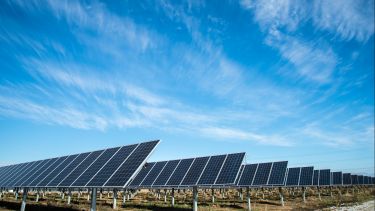Net zero: journey and targets
We're reducing emissions across our University and setting a responsible, science-led pathway to net zero.

Reaching net zero is one of the most significant commitments the University has ever made. We have already reduced our Scope 1 and 2 emissions by more than 40 per cent since our 2018/19 baseline, driven by sustained improvements in energy efficiency, changes to how we use our estate and a shift towards low-carbon electricity. This early progress has provided a strong foundation - but it has also highlighted the scale and complexity of the challenge ahead.
Our original 2020–2025 sustainability strategy set extremely ambitious carbon targets. Since then, the context around us has changed dramatically. The COVID-19 pandemic disrupted long-term planning and paused major decarbonisation projects across the sector. Global inflation and rising energy and construction costs made large infrastructure changes more difficult to deliver at scale. At the same time, universities across the UK have come under increasing financial pressure, requiring careful prioritisation of investment.
Work to build a detailed understanding of our carbon footprint has also transformed our view of what is technically and financially achievable. More robust data has revealed that some of our earlier Scope 3 assumptions were overly optimistic. For Scope 1 and 2 emissions, detailed decarbonisation modelling has shown the scale of infrastructure and sequencing required to transition away from gas and upgrade complex, ageing buildings.
Taken together, these conditions mean our original targets could not be delivered responsibly. That is why we have set new, science-aligned targets that remain ambitious yet achievable, and that reflect the real costs, constraints and opportunities facing the University today.
Our approach is grounded in strong governance, better data, responsible investment and shared responsibility across the whole University community. This ensures we can continue to make steady, transparent progress while protecting our academic mission, student experience and long-term financial sustainability.
Our net zero targets
We have established a clear pathway to net zero, aligned with the best available evidence for large organisations in our region:
- Reduce Scope 1 and 2 emissions by 80 per cent by 2030 (from a 2018/19 baseline).
- Reduce Scope 1 and 2 emissions by more than 90 per cent by 2035.
- Achieve net zero Scope 1 and 2 emissions by 2038.
- Achieve net zero Scope 3 emissions by 2045, with specific 2030 checkpoints in high-impact areas such as purchasing and capital projects, travel, laboratories, digital services and food.
These targets are aligned with science-based decarbonisation pathways for large organisations in the Sheffield City Region. They are underpinned by a detailed plan to decarbonise our energy use, reduce reliance on fossil fuels and improve the performance of our buildings, while also recognising the financial, engineering and practical delivery constraints we face.
Our commitment
Net zero is still our destination. The path is now better understood, more realistic and more robust. We will continue to:
- Invest in decarbonisation in a responsible and financially sustainable way.
- Improve data and transparency across all emission sources.
- Support staff and students to contribute through local action and behaviour change.
- Integrate sustainability into planning, budgeting, procurement and decision-making.
- Report progress openly, including challenges and areas where we need to improve.
Our journey to net zero will take time, collaboration and sustained effort - but it remains essential to the future of our University and the communities we serve.
